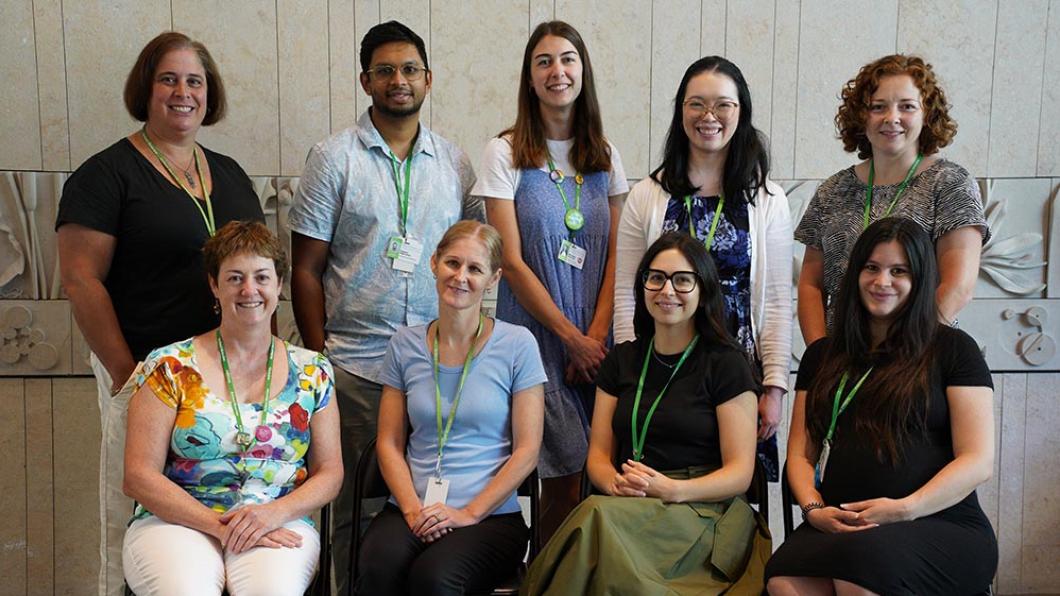
Clinic offers ‘one stop shop’ developmental treatment approach for children with severe restrictive eating
(Photo: The NDD restrictive eating clinic is made up of a group of multidisciplinary clinicians (pictured) whose goal is to improve feeding habits and quality of life)
The neurodevelopmental disorders (NDD) restrictive eating clinic at Holland Bloorview Kids Rehabilitation Hospital, made possible by Make Kids Count funding, is an innovative new approach to treating avoidant/restrictive food intake disorder (ARFID) in children with conditions including autism, cerebral palsy and global developmental delay.
Despite what many people believe, picky eating and ARFID are not the same thing. Children with severe restricted food intake—including ARFID—eat a very limited number of foods and may be at risk of malnutrition on the same level as seen in developing countries, blindness or even cardiac arrest.
Children with this serious medical condition may avoid food because of sensory reasons (e.g. texture, taste, temperature, colour), limited interest in eating or lack of awareness of hunger cues and experiences that make them fearful of eating (e.g. choking). Clinicians specializing in this condition note that AFRID is not caused by parents, caregivers or their environment.
Clinic fills gap for kids with developmental conditions and severe restrictive eating
Despite these alarming facts, there remains a significant gap in caring for children with developmental disorders with severe restricted food intake—including ARFID. Traditionally, many of these children have been referred from professional to professional (often within different organizations) for a one-time consultation.
“We are flipping the script on this siloed approach to treatment, offering a groundbreaking, multidisciplinary and ongoing developmental treatment approach that is the first-of-its-kind in Ontario,” says Dr. Rageen Rajendram, co-medical lead of Holland Bloorview’s NDD restrictive eating clinic and a developmental pediatrician who assesses children for autism.
“The model of care consists of an interdisciplinary assessment leading to individualized treatment plans. These plans may consist of addressing co-existing medical conditions and nutritional stability, parent/caregiver education and coaching, behavioural skills training and the impact of sensory concerns on feeding,” adds Dr. Cecilia Lee, co-medical lead of the clinic and a developmental pediatrician at Holland Bloorview.
Currently the clinic is only accepting internal referrals for children who are already being seen at Holland Bloorview. Recognizing that many other children can benefit from the clinic’s multidisciplinary, developmental treatment approach—where patients are seen by a highly-specialized team of professionals including medical staff, occupational therapists, behaviour analysts, speech language pathologists and dietitians—the hospital hopes to build capacity to open up referrals beyond its walls at some point in the future.
Life-changing results for children and families
The results, says Holland Bloorview registered dietitian Michaela Skarlicki, can be life-changing for many patients and families. She shares the example of one child seen who only ate 100 Ritz crackers every day. “Some of the families that we see spend the entire day attempting to feed their children. This can be incredibly stressful on the entire family,” says Skarlicki. “Holland Bloorview’s clinic acts as a one-stop-shop where we bring everyone together in the same room with a goal of improving feeding habits and quality of life. This means children and families can function better, whether that’s attending school or work, volunteering or participating more actively in their community. Connecting with families who have struggled to find the right resources for their child’s specific needs, helping them to feel seen and supported is incredibly rewarding.”
This new and critically important clinic is just one example of how Make Kids Count funding addressing the gaps for children and families, is fuelling innovation and new care pathways for children with disabilities at Holland Bloorview and building capacity within the system to begin right sizing the pediatric health care system.
Creating a playbook to help health care system build capacity
“This clinic has been built from the ground up, thanks in part, to a historic funding commitment from the provincial government,” says Dr. Golda Milo-Manson, vice-president, medicine and academic affairs, Holland Bloorview. “The team is learning, building and innovating as they go, and in doing so, are creating a playbook for others in the health care system to follow. Our hope is to be able to build the capacity of our health system partners to offer a similar model of care across the province and beyond.”
Dr. Rajendram adds that while children with ARFID will likely experience varying degrees of the condition throughout their lifetime, there is much to be hopeful about. The goal of the clinic, he adds, is to support patients, families and clinicians with access to personalized restrictive eating resources in order to help them manage the condition throughout their lifetime while supporting overall family quality of life.
For more information, visit on Holland Bloorview’s neurodevelopmental disorders (NDD) restrictive eating clinic program page.
About Make Kids Count and Holland Bloorview 2030
The role that Holland Bloorview Kids Rehabilitation Hospital plays in the health care system continues to evolve to ensure clients and families can access the care and services they need. The Make Kids Count plan to right-size the children’s health care system in Ontario was the culmination of collective advocacy from children’s health leaders, including Holland Bloorview. As a result, a historic investment of $330 million in funding by the Government of Ontario was made to impact all areas of the children’s health sector. This $11.8 million in new funding is fueling our strategic plan, Transformative Care, Inclusive World: Holland Bloorview 2030, and enabling us to foster the growth of a healthy team so that we can deliver care and services for children, youth and families that is agile, socially accountable and transformed by research and education. To learn more, visit Holland Bloorview Kids Rehabilitation Hospital Strategic Plan website.